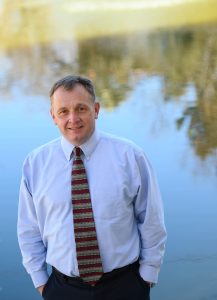Nexus program taps into NMSU expertise to solve food, energy and water challenges


A new food, energy and water nexus program launched by the Center of Excellence in Sustainable Food and Agricultural Systems at New Mexico State University’s College of Agricultural, Consumer and Environmental Sciences will bring together researchers from across the NMSU campus to find solutions to problems found across the state.
The nexus will unite faculty with different expertise from four colleges –ACES, Engineering, Business and Arts and Sciences. CESFAS is a hub of transdisciplinary and collaborative research that facilitates and develops sustainable food and value-added agricultural business.
Efren Delgado, co-director of CESFAS and associate professor of food science and technology, leads the nexus program with help from Jay Lillywhite, co-director of CESFAS and professor of agribusiness management and marketing. Natalie Goldberg, a former co-director of CESFAS, started the nexus project in the summer of 2020.
“Our goal is to create a roadmap to show the capacity NMSU has to solve specific problems in food, energy and water,” Delgado said. “We will identify situations, then identify faculty who can work to solve these issues.”
Many of those issues will focus on farm and land, food production, and energy and water challenges.
“This approach is extremely important for New Mexico, but our integrated approach will also help solve bigger problems,” said College of ACES Dean Rolando A. Flores. “We are located in semiarid land – it’s one of our signatures – so everything we need to look at under that umbrella is giving us a look into similar issues impacting us worldwide.”
Flores pointed to recently announced partnerships with two agrotechnology companies based in Israel, Tal-Ya Agriculture Solution and N-Drip, to study the companies’ signature water-saving systems. New Mexico and Israel both have semiarid land.
After identifying issues to address, CESFAS divides planning into four levels.
During the first level, faculty will identify specific aspects of each problem relating to farming, dairy production, water and irrigation, and other related issues. The second level will focus on issues arising after agricultural production, such as transportation, harvesting and supply chain issues. The third level will focus on identifying specific problems in manufacturing.
“There will be strong collaboration in this level, especially on issues involving engineering and traceability,” Delgado said.
For example, one issue the third level will explore is how to use product barcodes to let consumers know where items come from, which will make it easier to support local farmers. Another issue is how to obtain additives from dairy industry residual substances that can be hydrolyzed to create value-added products.
The fourth level will focus on distribution and retail and include faculty from ag economics.
“This level includes the distribution of food, resilience aspects and will explore COVID-19 pandemic problems related to production, distribution and labor,” Delgado said.
